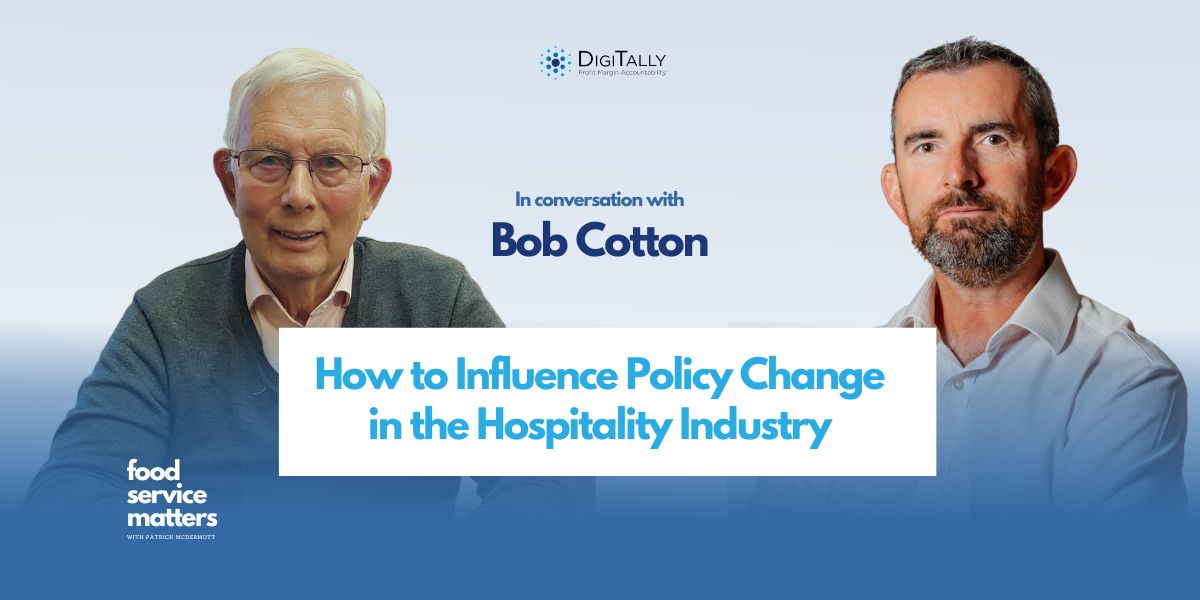Businesses in the hospitality industry often find themselves on the back foot when it comes to changes in government policies. For instance, take the UK government’s latest decision to scrap the mandatory declaration of food waste percentages.
Can food service companies take any action to influence public policy? And if so, how should they approach government relations?
In episode six of the Food Service Matters podcast, host Patrick McDermott interviews Bob Cotton, former head of the British Hospitality Association (BHA), now known as UKHospitality, the leading trade body representing all businesses in the UK’s hospitality sector.
Here, we focus on Bob’s thought-provoking points about the UK government’s power to incite change in the hospitality sector and how businesses can effectively influence policy themselves.
Government’s true role
When it comes to the government’s key responsibilities, Bob explains that its main role is investing in public services, such as healthcare and education, rather than supporting private industry. Although the government may provide transitional support for declining sectors, like mining and steel production, it generally avoids ongoing interventions in business.
“I have to explain to a lot of people who don’t really understand the government’s role that when it comes to business, the government is not there to prop up businesses or keep them going,” he clarifies, adding that while the government may “step in on a transitional basis”, for example to provide provisional assistance for declining sectors, it is not there to do much to support ongoing business strategy.
Craft win-win proposals
So, how can real change be brought about?
Interestingly, there have been moments when the hospitality sector successfully shaped government policies. This is because, as Bob explains, “If you can find areas that satisfy its objectives, the government will support them. The trick is to think about what you’re trying to achieve and what key industry players say they need. Then, look at the government’s agenda and see if you can bring the two together.”
Creating proposals which align with government goals is essential. For instance, after the foot and mouth disease outbreaks, Bob worked with industry leaders to secure matched government funding for an advertising campaign showing that the UK was open for tourism again. This not only aided the recovery of the hospitality sector but also supported the government’s own aims to boost growth and employment.
Similarly, Bob coordinated a unified commitment amongst top hotel owners that helped London win its bid to host the 2012 Olympics. The initiative ticked boxes for the government’s economic objectives, while also providing a much-needed boost to the hospitality sector.
Bring solutions rather than complaints
Another point Bob stresses is that the industry should put forward solutions when seeking changes in public policy rather than expressing grievances and expecting the government to step in.
“Come with solutions, and we’ll see what we can work on collectively,” he asserts.
Bob suggests analysing the possible priorities of the next government and creating proposals that address top issues, such as stimulating economic growth or reducing inflation. A proactive approach is more likely to achieve results than vague calls for lower taxes or subsidies.
The key takeaway is that policy change requires an entrepreneurial, solutions-focused perspective. Although the government has a limited role in directly supporting business strategy, well-crafted proposals that align goals can lead to win-win scenarios for both the hospitality industry and the government.
To listen to Patrick’s full interview with Bob Cotton, check out the Food Service Matters podcast on Spotify, Apple Podcasts or Google Podcasts.
Patrick is CEO of DigiTally, which is playing an increasingly important role as an intuitive and interconnected simple food service software that helps save time, increase margins and combat food waste. Keen to learn more? Let’s talk! Book a 30-minute call with Patrick and get your demo set up today.




